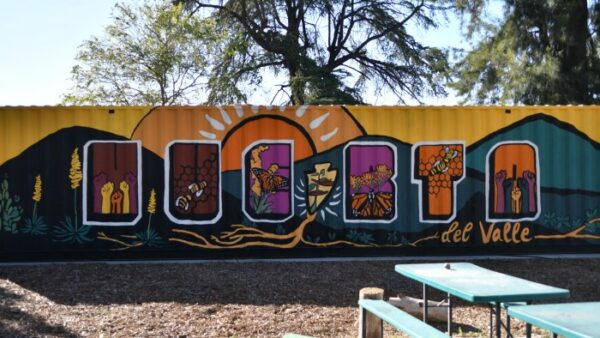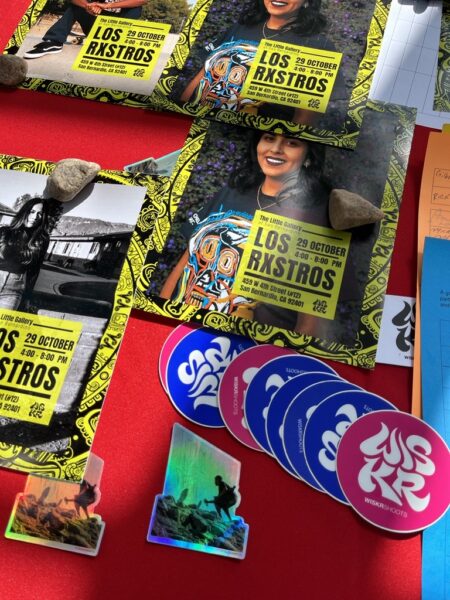
A community garden in California’s Inland Empire
Hey! This is Quinn Mays and I’ve been the field coordinator for the Listening Post Collective in the Inland Empire (IE) for more than 2 years.
Our original information ecosystem assessment included a list of community recommendations on how to close information gaps.
Since putting our assessment out into the world a year ago, we’ve been working with our community collaborators to accomplish a wide range of things. Let’s take a look:
Establish a community media hub and workshops for residents who want to develop their media productions and journalistic skills, or simply have a home base.
- We’ve been working closely with the Garcia Center For The Arts in San Bernardino to collaborate on media initiatives and establish a presence there for local media makers. As part of our community call for proposals, we also granted funding to a local media maker to purchase a large format printer, which now lives at the Garcia Center, to establish a needed resource for the myriad of talented local photographers.
Hire a community editor and Media developer.
- We hired our first ever community editor, Yvette Vargas, to develop local community media talent. Learn more about this unique job here.
Paid journalism opportunities for local BIPOC talent.
- As part of our assessment, funded by the Irvine Foundation, we offered a RFP and gave out major grants to three community run media startups, Frontline Observer, Space, and Los R(x)stros. Also, our Ford Foundation funded “Unfiltered IE” story grants enabled us to support amazing work by nine local media makers.
Multimedia topic-focused reporting in collaboration with IE based media outlets.
- Our “Unfiltered IE” story grants also gave us the opportunity to support reporting on two of the issues that came up frequently in our assessment, the environment and public health, and collaborate with local media, including local NPR station KVCR, and two of our local partners, Frontline Observer and the Space.
Spanish language media resource focused on Latino information needs.
- One of our original assessment grantees, Frontline Observer, has been publishing its groundbreaking reporting in Spanish, as well as English, making these essential stories to a substantial IE audience that wouldn’t otherwise be able to access them.
Create a local civic media fund.
- The Inland Empire Community Foundation launched a journalism and media fund shortly after the release of our assessment. We’re excited to see how this might benefit local media makers in the IE!

Quinn Mays and Becca Dobias visit Redlands, California to talk about inequities in zoning.
In addition to these highlights of how we’ve collaborated with folks in the IE over the past year to support community news and information flow, I also wanted to share some of my big takeaways from doing this gratifying work:
- There’s no one solution, different people have different needs. Think of your target audience’s demographics. Some information I had to print on flyers, others I shared on social media, and meeting in person at community events was always the best.
- Know your strengths and lean into that. I love conversations and I’m great at making people feel comfortable, especially in person, so I make a lot of phone calls and try to schedule in-person meetings to gather data. Maybe you’re more analytical and would be better at developing a survey which other people can help you distribute.

LPC grantee Los RXSTROS promoting their photo show
- Know your weaknesses and ask for help. I am not privy to local politics, so I went to speak with a local state representative and I learned not only how local representatives are involved in the passing of state bills, but also which local representatives might be interested in supporting my work.
- It’s okay not to know something and sometimes that’s better. When interviewing, it can be easy for me to just nod my head and say yes to avoid looking ignorant, but when I don’t understand what someone is saying or find something intriguing, I stop them and ask to know more. Different people have different knowledge and I’m in journalism to share knowledge as a lifelong learner!
- People know what they need and support them in their efforts. People told us in our assessment that government, community events, and public health were topics they wanted more information on. The timing of all of this overlapped with the rise of the Black Lives Matter movement, which for me, a local Black person, felt like the priority. That challenged me to really listen to my community partners and the ongoing issues they were surfacing.
- Not everyone will be interested and that’s okay. Sometimes when conducting the survey, I would reach out to an organization for a partnership and it wouldn’t be a good fit, or maybe a source kept avoiding my calls. It’s okay to move on because someone else will be interested.
- GET OUT THERE. Attend community events, follow organizations on social media, interact, introduce yourself, be friendly and ask about their lives – not just the work. People can’t trust who they don’t know. Covid made that hard for me at first, but as I was able to get involved in person and be myself, things got a lot easier.
- Be kind and patient. When you say you want to help make change, remember this is an investment and people are waiting to see if you are committed. Working with communities that have been exploited in many ways can be delicate so keep showing up consistently and don’t take things personally.
Thanks for listening y’all! – Quinn
Subscribe to our newsletter, keep an eye on our website, or visit our IE specific IG page to get updates on our Unfiltered IE project and other amazing LPC work.
